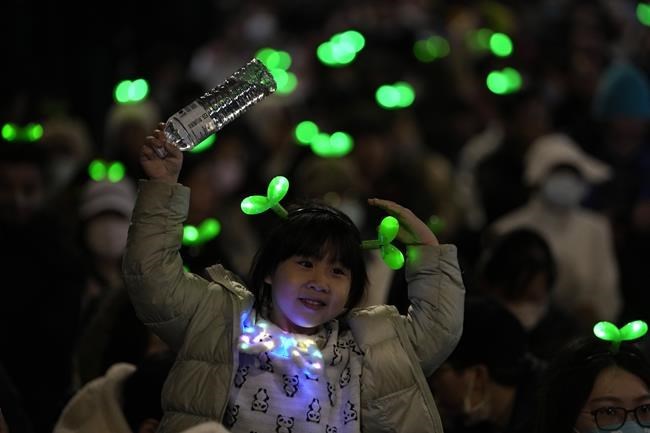TAIPEI, Taiwan (AP) — Taiwan is preparing to elect a president and legislature Saturday in what many see as a test of control with China, which claims the self-governing island republic as its own territory to be unified with force if necessary. The presidential race is tight, and both China and Taiwan's key ally, the U.S., are weighing in on political and economic issues they hope will sway voters.
The election pits Vice President Lai Ching-te, representing the Democratic Progressive Party, against Hou Yu-ih of the main opposition Nationalist Party, and former mayor of the capital Taipei, Ko Wen-je of the Taiwan People’s Party.
The U.S. strongly backs Taiwan against China’s military threats and the Biden administration plans to send an unofficial delegation comprised of former senior officials to the island shortly after the polls. That move could upset efforts to repair ties between Beijing and Washington that plunged in recent years over trade, COVID-19, Washington's support for Taiwan and Russia's invasion of Ukraine, which China has refused to condemn at the United Nations.
Along with the tensions with China, much in the Taiwan election hinges on domestic issues, particularly over an economy that was estimated to have only grown by 1.4% last year. That partly reflects inevitable cycles in demand for computer chips and other exports from the high-tech, heavily trade-dependent manufacturing base, and a slowing of the Chinese economy. But longer-term challenges such as housing affordability, a yawning gap between the rich and poor, and unemployment are especially prominent.
Candidates will make their final appeals Friday with campaigning to end at midnight. The candidate with the most votes wins, with no runoff. The legislative races are for districts and at-large seats.
While dinner table issues gather the most attention, China remains the one subject that can be ignored but not avoided. The two sides have no official relations but are linked by trade and investment. with an estimated 1 million Taiwanese spending at least part of the year on the mainland for work, study or recreation. Meanwhile, China has continued flying fighter planes and sailing warships near the island to put teeth behind its pledge to blockade, intimidate or invade.
Those threats were thrown into stark relief in 2022, when Beijing fired missiles over the island and conducted what was seen as a practice run of a possible future blockade of the Taiwan Strait after then-U.S. House Speaker Nancy Pelosi visited Taiwan. Chinese President Xi Jinping, at his most recent meeting with President Joe Biden in November, called Taiwan the “most sensitive issue” in U.S.-Chinese relations.
Washington is bound by law to provide Taiwan with the means to defend itself and consider all threats to the island as matters of “grave concern,” while remaining ambiguous on whether it would use military forces. Over recent years, the U.S. has stepped up support for Taiwan as Beijing ratchets up military and diplomatic pressure on the island, although the wars in Ukraine and Gaza have drawn down what U.S. military industries can provide to customers and allies.
The U.S. government insists the differences between Beijing and Taipei be resolved peacefully and opposes any unilateral change to their status quo. While Chinese leaders and state propaganda proclaim unification is inevitable and will be achieved at any cost, Taiwanese have consistently voted in favor of maintaining their de facto political independence.
Lai is considered the front-runner in the race, but Hou trails closely. While the Nationalists formally support unification with China, they say they want to do so on their own terms, a somewhat abstract concept given the Communist Party's demand for total power, but which some consider as a useful workaround to avoid outright conflict.
Beijing has labeled Lai a “Taiwan independence element,” an appellation he has not repudiated and which carries little or no stigma in Taiwan. Lai, however, has pledged to continue current President Tsai Ing-wen's policy that Taiwan is already independent and needs to make no declaration of independence that could spark a military attack from China.
While running third in most surveys, the TPP's Ko said during a news conference Friday he would aim to strike a balance between Taiwan and the U.S. that would not upset relations with China.
“The U.S. is the most powerful country in the world and Taiwan’s most important ally,” he said. “So no matter who is elected, the relationship between Taiwan and the U.S. will not change.”
Ko said he is the only “acceptable” candidate for both Washington and Beijing, adding that while there’s nothing Taiwan could do to please both China and the U.S., it is important for the island to refrain from “behavior that is intolerable to either side.”
___
Follow AP's Asia-Pacific coverage at https://apnews.com/hub/asia-pacific
Christopher Bodeen And Simina Mistreanu, The Associated Press




